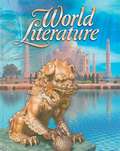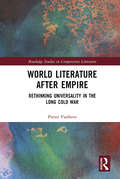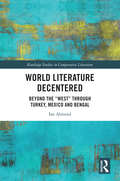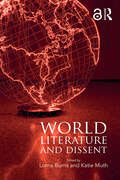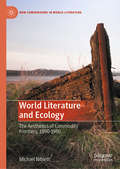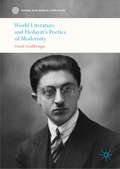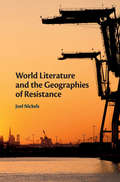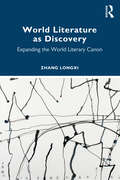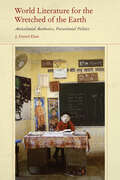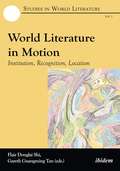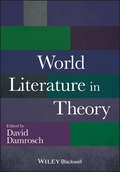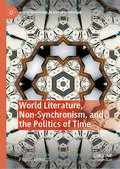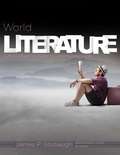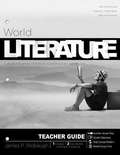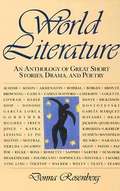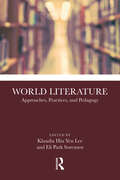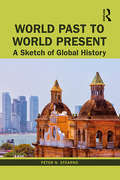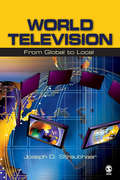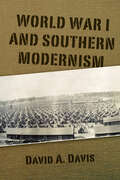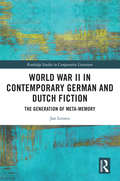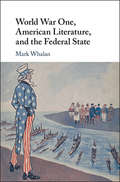- Table View
- List View
World Literature (3rd Edition)
by Holt Rinehart WinstonThe textbook contains World Myths and Folktales, The African Literary Tradition, The ancient Middle East, The Literature of Ancient Mesopotamia, Greek and Roman Literatures, Indian Literature, Chinese and Japanese Literatures, Persian and Arabic Literatures, The Middle Ages, From the Renaissance to the Enlightenment, The nineteenth Century: Romanticism to Realism, Modern and Contemporary World Literature, and a lot more.
World Literature (3rd Edition)
by Jan AndersonWorld Literature introduces students to the wonderful variety of classic literature produced through the centuries. The first ten units showcase a medley of writing styles that illustrate various literary devices or themes. The last six units present literature by region and era. This breakdown helps the student to gain a full understanding of literature's variety, beauty, and history.
World Literature After Empire: Rethinking Universality in the Long Cold War (Routledge Studies in Comparative Literature)
by Pieter VanhoveThis book makes the case that the idea of a "world" in the cultural and philosophical sense is not an exclusively Western phenomenon. During the Cold War and in the wake of decolonization a plethora of historical attempts were made to reinvent the notions of world literature, world art, and philosophical universality from an anticolonial perspective. Contributing to recent debates on world literature, the postcolonial, and translatability, the book presents a series of interdisciplinary and multilingual case studies spanning Europe, the United States, and China. The case studies illustrate how individual anti-imperialist writers and artists set out to remake the conception of the world in their own image by offering a different perspective centered on questions of race, gender, sexuality, global inequality, and class. The book also discusses how international cultural organizations like the Afro-Asian Writers’ Bureau, UNESCO, and PEN International attempted to shape this debate across Cold War divides.
World Literature Decentered: Beyond the “West” through Turkey, Mexico and Bengal (Routledge Studies in Comparative Literature)
by Ian AlmondWhat would world literature look like, if we stopped referring to the “West”? Starting with the provocative premise that the “‘West’ is ten percent of the planet”, World Literature Decentered is the first book to decenter Eurocentric discourses of global literature and global history – not just by deconstructing or historicizing them, but by actively providing an alternative. Looking at a series of themes across three literatures (Mexico, Turkey and Bengal), the book examines hotels, melancholy, orientalism, femicide and the ghost story in a series of literary traditions outside the “West”. The non-West, the book argues, is no fringe group or token minority in need of attention – on the contrary, it constitutes the overwhelming majority of this world.
World Literature and Dissent
by Lorna Burns Katie MuthWorld Literature and Dissent reconsiders the role of dissent in contemporary global literature. Bringing together scholars of world and postcolonial literatures, the contributors explore the aesthetics of resistance through concepts including the epistemology of ignorance, the rhetoric of innocence, the subversion of paying attention, and the radical potential of everydayness. Addressing a broad range of examples, from the Maghrebian humanist Ibn Khaldūn to India’s Facebook poets and examining writers such as Langston Hughes, Ben Okri, Sara Uribe, and Merle Collins, this highly relevant book reframes the field of world literature in relation to dissenting politics and aesthetic. It asks the urgent question: how critical practice might cultivate radical thought, further social justice, and value human expression?
World Literature and Ecology: The Aesthetics of Commodity Frontiers, 1890-1950 (New Comparisons in World Literature)
by Michael NiblettLocated at the intersection of world-literary studies and the environmental humanities, this book analyses how fiction and poetry respond to the ecological transformations entailed by commodity frontiers. Examining the sugar, cacao, coal, and oil frontiers in Trinidad, Brazil, and Britain, World Literature and Ecology shows how literary texts have registered the relationship between the re-making of biophysical natures and struggles around class, race, and gender. It combines a materialist theory of world-literature with the insights of the world-ecology perspective to generate compelling new readings of writers such as Rhys Davies, Yseult Bridges, Lewis Jones, José Lins do Rego, Ellen Wilkinson, Jorge Amado, Gwyn Thomas, and Ralph de Boissière. The book represents a timely intervention into a series of field-defining debates around peripheral realisms and modernisms, ecocriticism, and the energy humanities.
World Literature and Hedayat’s Poetics of Modernity (Canon and World Literature)
by Omid AzadibougarThis book introduces the canonical figure Sadegh Hedayat (1903–1951) and draws a comprehensive image of a major intellectual force in the context of both modern Persian Literature and World Literature. A prolific writer known for his magnum opus, The Blind Owl (1936), Hedayat established the use of common language for literary purposes, opened new horizons on imaginative literature and explored a variety of genres in his creative career. This book looks beyond the reductive critical tendencies that read a rich and diverse literary profile in light of Hedayat’s suicide, arguing instead that his literary imagination was not solely the result of genius but rather enriched by a vast network of the world’s literary traditions. This study reflects on Hedayat’s attempts at various genres of artistic creation, including painting, fiction writing, satire and scholarly research, as well as his persistent struggles for artistic authenticity, which transcended solidly established literary and artistic norms. Providing a critical reading of Hedayat’s work to untangle aspects of his writing – including reflections on science, religion, nationalism and coloniality – alongside his pioneering work on folk culture, and how humor informs his writings, this text offers a critical review of the status of Persian literature in the contemporary landscape of the world’s literary studies.
World Literature and the Geographies of Resistance
by Joel NickelsThis book proposes a new definition of world literature: an archive of democratic mechanisms external to state power. Accordingly, World Literature and the Geographies of Resistance takes shape as an exploration of nonstate space - territories of self-government that contest the vertical command structures of the state. Joel Nickels argues that literature devoted to these processes of spatial occuption can help us imagine democratic alternatives to state space and to the regime of legalized dispossession that goes under the name of globalization. Conceptualized in these terms, world literature can be viewed not as the corollary of 90s-era cosmopolitanism, but as a document of strategies for the militant reorganization of social space. This ambitious book addresses the work of Patrick Chamoiseau, Ousmane Sembene, Miguel Ángel Asturias, Claude McKay, Arundhati Roy, T. S. Eliot and Melvin Tolson. It engages with theories of transnationality, diaspora and postcoloniality, as well as world literature.
World Literature as Discovery: Expanding the World Literary Canon
by Zhang LongxiThe rise of world literature is the most noticeable phenomenon in literary studies in the twenty-first century. However, truly well-known and globally circulating works are all canonical works of European or Western literature, while non-European and even "minor" European literatures remain largely unknown beyond their culture of origin. World Literature as Discovery: Expanding the World Literary Canon argues that world literature for our time must go beyond Eurocentrism and expand the canon to include great works from non-European and "minor" European literatures. As much of the world’s literature remains untranslated and unknown, the expansion will be an exciting process of discovery. By discussing fundamental questions around canon, circulation, aesthetic values, translation, cosmopolitanism, and the literary universal, Zhang Longxi proposes a new and liberating concept of world literature that will shape world literature worthy of its name. This book speaks for a more inclusive idea of world literature and shows students and scholars alike that all the literary traditions, particularly non-European traditions, will be able to make important contributions and expand the canon of world literature.
World Literature for the Wretched of the Earth: Anticolonial Aesthetics, Postcolonial Politics
by J. Daniel Elam&“Lays out a novel and provocative argument . . . Essential reading for those concerned with the future of comparative literature and the world.&” ―Natalie Melas, Cornell University World Literature for the Wretched of the Earth recovers a genealogy of anticolonial thought that advocated collective inexpertise, unknowing, and unrecognizability. Early-twentieth-century anticolonial thinkers endeavored to imagine a world emancipated from colonial rule, but it was a world they knew they would likely not live to see. Written in exile, in abjection, or in the face of death, anticolonial thought could not afford to base its politics on the hope of eventual success, mastery, or national sovereignty. J. Daniel Elam shows how anticolonial thinkers theorized inconsequential practices of egalitarianism in the service of an impossibility: a world without colonialism. Framed by a suggestive reading of the surprising affinities between Frantz Fanon&’s political writings and Erich Auerbach&’s philological project, World Literature for the Wretched of the Earth foregrounds anticolonial theories of reading and critique in the writing of Lala Har Dayal, B.R. Ambedkar, M.K. Gandhi, and Bhagat Singh. These anticolonial activists theorized reading not as a way to cultivate mastery and expertise but as a way, rather, to disavow mastery altogether. To become or remain an inexpert reader, divesting oneself of authorial claims, was to fundamentally challenge the logic of the British Empire and European fascism, which prized self-mastery, authority, and national sovereignty. Bringing together the histories of comparative literature and anticolonial thought, Elam demonstrates how these early-twentieth-century theories of reading force us to reconsider the commitments of humanistic critique and egalitarian politics in the still-colonial present.
World Literature in Motion: Institution, Recognition, Location (Studies In World Literature Ser. #7)
by Tan Shi Flair Donglai Gareth GuanmingBy bringing in different degrees of circulation in different regions and languages, this collection shows that while literary centers do exist in what Pascale Casanova calls “the international literary space,” their power does not operate unilaterally and modes of intercultural circulation do exist beyond their control. The title World Literature in Motion highlights the fact that world literature is always already the product of certain modes of conceptual and material mobility and mediation.
World Literature in Theory
by David DamroschWorld Literature in Theory provides a definitive exploration of the pressing questions facing those studying world literature today. Coverage is split into four parts which examine the origins and seminal formulations of world literature, world literature in the age of globalization, contemporary debates on world literature, and localized versions of world literature Contains more than 30 important theoretical essays by the most influential scholars, including Johann Wolfgang von Goethe, Hugo Meltzl, Edward Said, Franco Moretti, Jorge Luis Borges, and Gayatri Spivak Includes substantive introductions to each essay, as well as an annotated bibliography for further reading Allows students to understand, articulate, and debate the most important issues in this rapidly changing field of study
World Literature, Fifth Edition
by ChapmanThis beautifully illustrated anthology includes twelve units representing writers from around the world. Built-in studies of historical and cultural backgrounds enable students to understand the literature. Students will practice interpreting literature through a biblical lens. Critical thinking skills are built through answering thought-provoking responses worldview and literature-related questions. Students will also practice interpreting symbols and themes in visual art with a Spotlight on Visual Literacy feature. Poetry memorization continues in this grade. Students are also encouraged to memorize select poems.
World Literature, Non-Synchronism, and the Politics of Time (New Comparisons in World Literature)
by Filippo MenozziDrawing on a Marxist concept of world literature, this book is a study of the manipulations of time in contemporary anglophone fiction from Africa and South Asia. Through critical work and literary reading, this research explores the times other than the present that seem to haunt an era of capitalist globalisation: nostalgic feelings about bygone ideals of identity and community, appeals to Golden Ages, returns of the repressed and anxious anticipations of global extinction and catastrophe. The term non-synchronism explored in this book captures these dislocations of the present, while offering a critical lens to grasp the politics of time of an era marked by the continuing expansion of capitalist modernity. Most importantly, non-synchronism is a dialectical paradigm charged with antagonistic political valences. The literary analysis presented in the volume hence connects the literary manipulation of time to discourses on extinction, accumulation, nostalgia, modernity and survival in global politics and literature.
World Literature-Student
by James P. StobaughEnjoy beloved classics while developing vocabulary, reading, and critical thinking skills! Each literature book in the series is a one-year course Each chapter has five lessons with daily concept-building exercises, warm-up questions, and guided readings Easy-to-use with suggested reading schedules and daily calendar Equips students to think critically about philosophy and trends in culture, and articulate their views through writing A well-crafted presentation of whole-book or whole-work selections from the major genres of classic literature (prose, poetry, and drama), each course has 34 chapters representing 34 weeks of study, with an overview of narrative background material on the writers, their historical settings, and worldview. The rich curriculum's content is infused with critical thinking skills, and an easy-to-use teacher's guide outlines student objectives with each chapter, providing the answers to the assignments and weekly exercises. The final lesson of the week includes both the exam, covering insights on the week's chapter, as well as essays developed through the course of that week's study, chosen by the educator and student to personalize the coursework for the individual learner.
World Literature-Teacher
by James P. StobaughEnjoy beloved classics while developing vocabulary, reading, and critical thinking skills! Each literature book in the series is a one-year course Each chapter has five lessons with daily concept-building exercises, warm-up questions, and guided readings Easy-to-use with suggested reading schedules and daily calendar Equips students to think critically about philosophy and trends in culture, and articulate their views through writing A well-crafted presentation of whole-book or whole-work selections from the major genres of classic literature (prose, poetry, and drama), each course has 34 chapters representing 34 weeks of study, with an overview of narrative background material on the writers, their historical settings, and worldview. The rich curriculum's content is infused with critical thinking skills, and an easy-to-use teacher's guide outlines student objectives with each chapter, providing the answers to the assignments and weekly exercises. The final lesson of the week includes both the exam, covering insights on the week's chapter, as well as essays developed through the course of that week's study, chosen by the educator and student to personalize the coursework for the individual learner.
World Literature: An Anthology of Great Short Stories, Drama, and Poetry
by Mcgraw-Hill Staff Donna RosenbergAn exciting anthology of thought provoking short stories, plays & poems, written by major authors from all over the world, translated to English. Seven geographical areas are covered. The selections span from the 13th Century BC to the late 20th Century AD. Each selection includes critical & biographical information, questions which emphasize inferential thinking, expository & creative writing assignments & a glossary of literary terms.
World Literature: Approaches, Practices, and Pedagogy
by Eli Park Sorensen Klaudia Hiu Yen LeeWorld Literature: Approaches, Practices, and Pedagogy combines theoretical explorations and pedagogy to explore approaches to teaching some of the key concepts, issues, and topics in world literary studies.Recognising the evolving, and at times contested, meanings of ‘world literature,’ this book treats world literature as a mode of reading and one that provides opportunities to create a space for critical discussions and reflections on understanding, unpacking, and at times, challenging, some of the assumptions and practices in world literary studies. Contributors discuss a wide array of topics, including the role of translation and literary marketplace in global circulation of texts, the function and problematics of paratexts, questions of co-authorship in transnational contexts, debates on major/minor in world literature, cosmopolitanism, and the impact of English as a lingua franca on the development of the field.Accompanied by reading questions, individual and group exercises, as well as suggested further readings, this collection offers a practical resource for instructors and an accessible guide to advanced undergraduate and postgraduate students taking world literature courses in different parts of the world.
World Of Language
by Wendy Davis Sandra Breuer Judy BrimThe book that unlocks all imagination opening every mind to new and exciting ideas. World of language is a literature book that indeed enlarges your world to think, read, speak, listen and write.
World Past to World Present: A Sketch of Global History
by Peter N. StearnsWorld Past to World Present: A Sketch of Global History provides an unusually brief and present-focused treatment of human history beginning with the advent of agriculture and ending with considerable attention to world history developments since World War II. This accessible and concise text covers a very real but selected history of the human experience. The book emphasizes the importance of contacts and exchanges among different cultures and economies up to contemporary globalization, and consistent attention is devoted to comparisons among major regional societies. The characteristics of agricultural, and later industrial, societies help establish a larger framework within the text. Peter N. Stearns works to connect past developments to contemporary global patterns and problems, explicitly balancing major changes with significant continuities. Key features include: A "no-frills" approach to an expansive stretch of human history Encourages students to understand the importance of studying history by focusing on aspects of the past that are particularly useful in assessing the current state of the world Invites instructors to combine the advantages of systematic summary coverage with varied supplementary reading Nine maps illustrate important movements and civilizations throughout the world. Truly international in coverage, this book has been specifically designed as a core text for Global History survey courses.
World Philology
by Sheldon PollockPhilology--the discipline of making sense of texts--is enjoying a renaissance within academia. World Philology charts the evolution of philology across the many cultures and time periods in which it has been practiced and demonstrates how this branch of knowledge, like philosophy and mathematics, is essential to human understanding.
World Television: From Global to Local
by Joseph D. StraubhaarWorld Television: From Global to Local, a new assessment of the interdependence of television across cultures and nations brings together the most current research and theories on the subject. By examining recent developments in the world system of television as well as several theories of culture, industry, genre, and audience, author Joseph D. Straubhaar offers new insights into the topic. He argues that television is being simultaneously globalized, regionalized, nationalized, and even localized, with audiences engaging it at multiple levels of identity and interest; therefore the book looks at all these levels of operation.Key FeaturesDraws upon both international communication and cultural studies perspectives: Presents a new model is presented that attempts to move beyond the current controversies about imperialism and globalization.Looks at historical patterns: Historical patterns across cultures and countries help compare where television has been and where it is going.Takes a contemporary focus: Uses of technology, flows and patterns of program development, genres of television, the interaction of producers and audiences, and patterns of audience choice among emerging alternatives are examined. Explores how the audience for these evolving forms of television is structured: The effects of these forces or patterns of television have on both cultural formations and individual identities are identified.Intended AudienceThis is an excellent text for advanced undergraduate and graduate courses in Globalizatiion and Culture, Global Media, Television Studies, Television Criticism, and International Media.
World War I and Southern Modernism
by David A. DavisWinner of the 2018 Eudora Welty PrizeWhen the United States entered World War I, parts of the country had developed industries, urban cultures, and democratic political systems, but the South lagged behind, remaining an impoverished, agriculture region. Despite New South boosterism, the culture of the early twentieth-century South was comparatively artistically arid. Yet, southern writers dominated the literary marketplace by the 1920s and 1930s. World War I brought southerners into contact with modernity before the South fully modernized. This shortfall created an inherent tension between the region's existing agricultural social structure and the processes of modernization, leading to distal modernism, a form of writing that combines elements of modernism to depict non-modern social structures. Critics have struggled to formulate explanations for the eruption of modern southern literature, sometimes called the Southern Renaissance. Pinpointing World War I as the catalyst, David A. Davis argues southern modernism was not a self-generating outburst of writing, but a response to the disruptions modernity generated in the region. In World War I and Southern Modernism, Davis examines dozens of works of literature by writers, including William Faulkner, Ellen Glasgow, and Claude McKay, that depict the South during the war. Topics explored in the book include contact between the North and the South, southerners who served in combat, and the developing southern economy. Davis also provides a new lens for this argument, taking a closer look at African Americans in the military and changing gender roles.
World War II in Contemporary German and Dutch Fiction: The Generation of Meta-Memory (Routledge Studies in Comparative Literature)
by Jan LensenWorld War II in Contemporary German and Dutch Fiction: The Generation of Meta-Memory offers a comparative study of the construction of World War II memory in contemporary German, Flemish, and Dutch literature. More specifically, it investigates in what ways the large temporal distance to the historical events has impacted how literary writers from these three literatures have negotiated its meaning and form during the last decades. To that end, this book offers analyses of nine novels that demonstrate a pronounced reflexivity on the conditions of contemporary remembering. Rather than a dig for historical truth or a struggle with historical trauma, these novels reflect on the transmission, the narrative shapes, the formation processes, and the functions of World War II memory today, while asserting a self-conscious and often irreverent approach toward established mnemonic routines, practices, and rules. As the analyses show, this approach is equally articulated through the novels’ poetics, which are marked by a large formal diversity and a playfulness that highlights mnemonic agency, a posttraumatic positioning, and the ascendency of the literary over the historiographical. Based on these findings, this book proposes the emergence of a new paradigm within the postwar cultural assessment of World War II: the generation of meta-memory.
World War One, American Literature, and the Federal State
by Mark WhalanIn this book, Mark Whalan argues that World War One's major impact on US culture was not the experience of combat trauma, but rather the effects of the expanded federal state bequeathed by US mobilization. Writers bristled at the state's new intrusions and coercions, but were also intrigued by its creation of new social ties and political identities. This excitement informed early American modernism, whose literary experiments often engaged the political innovations of the Progressive state at war. Writers such as Wallace Stevens, John Dos Passos, Willa Cather, Zane Grey, and Edith Wharton were fascinated by wartime discussions over the nature of US citizenship, and also crafted new forms of writing that could represent a state now so complex it seemed to defy representation at all. And many looked to ordinary activities transformed by the war - such as sending mail, receiving healthcare, or driving a car - to explore the state's everyday presence in American lives.
